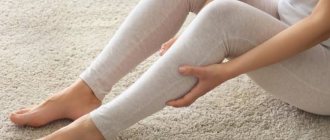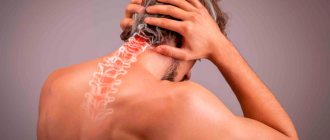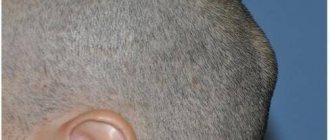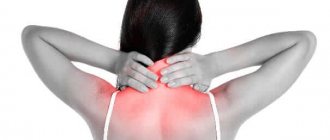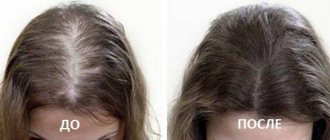Dry seborrhea is a problematic condition of the scalp in which the processes of sebum production are disrupted. The peculiarity of the dry version of seborrhea is the thicker composition of sebum, which as a result clogs the sebaceous glands and prevents its normal outflow. Most often, children and adolescents are susceptible to dry seborrhea. Adults also complain of dry seborrhea, but somewhat less frequently. The treatment regimen will differ depending on the patient’s age, the characteristics of the skin condition, the severity of seborrhea and other factors. In the treatment of a diagnosed dry form of seborrhea, various means of normalizing the condition of the skin are always used - medications, physiotherapy, and cosmetics.
Main types of scalp
- Normal, with the sebaceous glands producing only the required amount of sebum to maintain softness and elasticity.
- Dry, with scanty presence of this fat and insufficient supply of nutritional components. The skin dries out and the head itches.
- Flaky dandruff with the appearance of dandruff, scalp burning, discomfort, the patient complains of itching regardless of the type, hormonal imbalance appears.
- Oily, characterized by excess sebum production, tangled and greasy hair.
- The deeper ones produce new cells to replace the dead ones on the surface of the epidermis.
- They exfoliate and are removed from the top layer, gradually renewing the scalp.
- Here are hair follicles, sebaceous and sweat glands, sebum, nerve endings, and cells responsible for immune defense.
- They provide metabolic functions, tactile sensations, and regulate skin temperature.
The structure of the skin includes several layers:
Any failure in these functions can lead to disruption of processes and the appearance of problems when the scalp itches.
Causes of increased sensitivity of the scalp
Scalp sensitivity can be caused by various factors. One of them is a violation of the process of sebum secretion, which leads to itching.
Poor environmental conditions and stress can also lead to scalp irritation. In fact, due to air pollution, harmful chemicals are deposited on the hair, which form a dull film on the surface of the hair and, like stress, lead to the production of free radicals. These free radicals change the structure of the scalp and lead to changes in the hair follicle. Hair loses its shine and strength, and hair loss may begin. The result is a sensitive and irritated scalp.
The following factors also affect scalp sensitivity:
- unbalanced diet;
- aggressive shampoos, frequent drying and styling of hair with a hair dryer;
- wearing motorcycle helmets for long periods of time;
- chlorinated water;
- direct sunlight.
Itching, red patches and flaky skin can be symptoms of conditions such as eczema and psoriasis. In these cases, special treatment is necessary.
Scalp problems
The most common complaints include itching, dandruff, dryness and flaking. The causes of these symptoms can be different:
- unfavorable influences of the external environment;
- sun activity;
- chlorinated water;
- blow drying;
- frequent showers;
- incorrectly selected shampoo;
- varnishes, masks and other hair care products;
- low humidity levels;
- allergy;
- hormonal imbalance;
- genetic predisposition.
Also, dryness and itching, flaking of the skin can cause atopic dermatitis and other skin diseases.
Treatment of seborrhea
During treatment, your An-Tech Research Laboratories physician may recommend the following:
- adherence to the principles of healthy eating, including a special diet rich in proteins, plant foods and healthy fats;
- taking vitamins and minerals both separately and as part of complex preparations;
- refusal of aggressive effects on the skin that occur during hairdressing procedures - hair dyeing, lamination, perm or blow-drying;
- eliminating bad habits of smoking and drinking alcohol;
- use of special ointments for the skin;
- taking medications;
- physiotherapeutic procedures course.
All drugs and procedures for the dry form of seborrhea are prescribed only after a thorough history taking and the necessary research. The doctor may prescribe a scalp scraping, take hair tests, and examine the condition of the scalp under a microscope.
Types of skin itching
The condition when the back of the head or the entire skin itches is a protective reaction to remove the irritating factor. There are different types of itching:
- Dermatological, characteristic of atopic dermatitis, scabies, lice, psoriasis.
- Neurological, arising from lesions of the nervous system.
- Systemic, observed in various pathologies of internal organs.
- Psychogenic, appearing under stress and psycho-emotional tension.
- Multifactorial, in the case of simultaneously different causes of origin.
- Idiopathic, with an unclear etiology.
- Other.
What to do if you're dry
Choose milder herbal shampoos enriched with plant oils and extracts. They will help restore lost balance and remove increased sensitivity, redness and irritation.
Use argan and olive oil, which contains unsaturated fatty acids and vitamin E (tocopherol), which transform hair into elastic, elastic and silky. They contain linoleic, oleic, palmitic, stearic, vanillic acid, as well as fungicides, tyrosol, and sterols. This composition moisturizes the scalp and strengthens brittle hair.
Take a not too hot shower, wash with slightly warm water. Higher temperatures help remove fat, causing irritation.
Symptoms of seborrhea
With the dry version of seborrhea, most patients experience tangible signs that prompt them to consult a specialist and undergo treatment for seborrhea:
- fine dandruff;
- thinning and weakness of scalp hair;
- increased hair loss per day compared to normal;
- crusts and scratch marks on the scalp;
- itching, dry peeling, burning of the scalp.
With seborrheic dermatitis, seborrheic alopecia may develop: the hair becomes thinner, weaker and dull, begins to split, loses its healthy appearance and shine, and may fall out rapidly.
The disease does not have a systematic effect on the body, but it makes you suffer from changes in the appearance of your hair, dries out the scalp, and with serious causes of its occurrence, emotional disorders are possible.
Treatment of dry seborrhea of the scalp is always aimed at eliminating provoking factors. It is necessary to establish what disorders the patient has and draw up a treatment plan for them first. If there is a pathogenic flora on the skin, you will need special cosmetics designed for seborrhea. In any case, the doctor will recommend products with a calming and anti-inflammatory effect - special shampoos, emulsions for application to the skin.
With seborrhea, it is important to establish the correct functioning of the gastrointestinal tract, establish a healthy daily routine with sufficient sleep and rest, and minimize existing stress. In addition to treatment, it is worth paying attention to physical activity and psycho-emotional health.
Pathologies that cause acute itching of the scalp
- Dandruff can be large in oily skin and small in dry skin. It appears as a result of stress, poor nutrition, hormonal imbalance, and the influence of a warm and humid climate.
- Seborrheic eczema is characterized by not only itching, but also rashes, redness and inflammation of the skin, often leading to the appearance of blisters. The rash can also affect the neck and face.
- Fungal infections are difficult to treat and cause itching, redness, blisters, and peeling. Over time, fungal spores penetrate deeper layers and cause severe infection and intoxication. They easily infect other people and are transmitted through contact and household contact.
- Seborrheic dermatitis is characterized by inflammation and affects areas rich in sebaceous glands. It is caused by fungi of the genus Malassezia, the same as dandruff, and is characterized by flaking and varying degrees of damage to the skin and hair.
- Infestation with lice, fleas, ticks and other parasites turns hair into a breeding ground for disease. They become covered with nits, which are difficult to comb out even with a special comb. In this case, total treatment with anti-pediculosis drugs, which are sold in pharmacies in the form of sprays and solutions, is required.
- Allergic reactions can occur even to hair care and styling products that have been used for more than one year. The cause of the allergy can be found out with a test from a dermatologist.
- Chemical and mechanical irritation with acute itching is also caused by hair dye, wearing tight headwear, and the use of care products with aggressive components included in the composition.
- Psoriasis manifests itself as small flaking of the scalp, redness, formation of plaques and thick scabs. It forms both single spots and affects large damaged areas. The patient feels tightness of the skin, itching, and it begins to peel off severely.
Itching of the scalp Constant burning of the scalp, tingling, desire to scratch - painful itching. Why does it arise? The reasons may be the following: an allergic reaction or the development of a dermatological or trichological disease.
Inflammatory disease of the scalp
03.02.2021
Seborrhea is an inflammatory disease of the scalp. With this disease, the volume of sebum and its composition increase. The disease is manifested by itching, peeling and thickness of the stratum corneum. The scalp also becomes inflamed, red, swollen and constantly itchy.
Causes
There is no main cause for this disease. The disease can occur due to genetics, metabolic disorders, and also under unfavorable environmental conditions. Often this disease appears due to reasons such as:
- violation of the hormonal state of the body;
- pathologies of the endocrine system .
The main component of this disease is a yeast-like fungus that lives in a large number of people. The number of these fungi can increase sharply under the influence of unfavorable environmental factors.
Symptoms
The main symptoms of this disease are: flaking of the scalp, inflammation, itching and burning. If this disease is neglected and you do not consult a specialist for a long time, it can appear on the forehead, eyelashes, eyelids and eyebrows.
With dry seborrhea, small white scales appear, which are accompanied by severe itching. This type of disease is quite easy to diagnose and treat. If you don't wash your hair for a long time, the disease can begin to spread to new areas of the body.
Diagnosis and treatment
Trichologists diagnose and treat this disease . First you need to determine the cause of this disease. At the same time, hormones , gastrointestinal tract, as well as the state of immunodeficiency are checked.
Antifungal agents are used to treat this disease. They are more effective than anti-inflammatory drugs. Also, during treatment, it is necessary to adhere to a strict diet, which includes: avoiding fatty, fried, sweet and salty foods, as well as eating foods rich in fiber, vitamin B and zinc. To improve the scalp and hair, it is necessary to use vitamins and vitamin complexes containing brewer's yeast.
In severe cases of this disease, keratolytic drugs are prescribed. The scales can be softened using natural oils or petroleum jelly. Next, you need to smear the scalp with antifungal drugs. If this type of therapy is ineffective, then drugs containing hormones .
Also, for this disease, the patient is prescribed scalp massage cryomassage ) and stimulation of hair growth (darsonvalization).
After treatment for this disease, the patient will have to use medicated shampoos for some time to prevent relapse of the disease. Subsequently, such shampoos are used about twice a month for prevention.
To prevent complications and serious consequences of this disease, it is necessary to promptly seek help from a specialist. The prognosis for seborrhea is quite favorable. The disease is treated relatively quickly.
Published in Dermatology Premium Clinic

